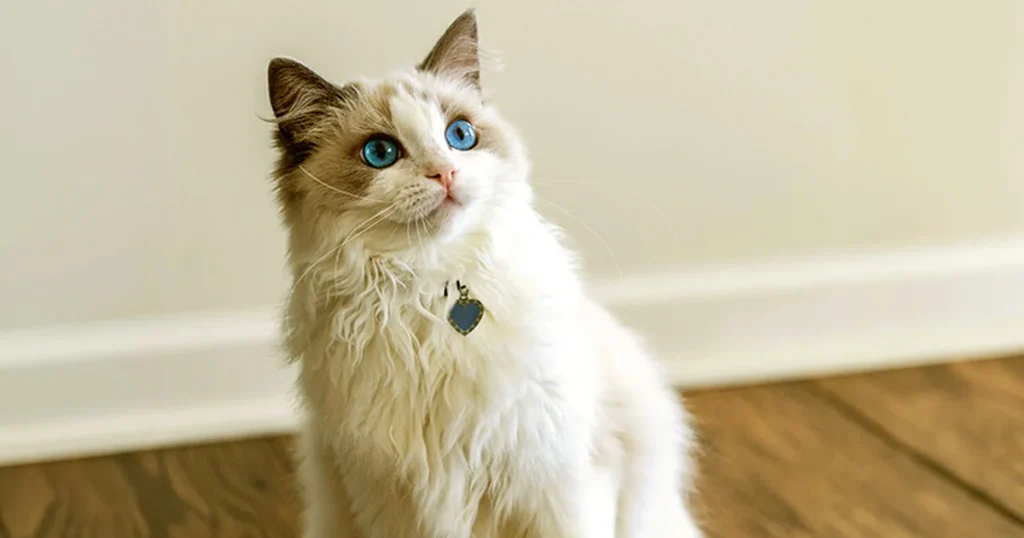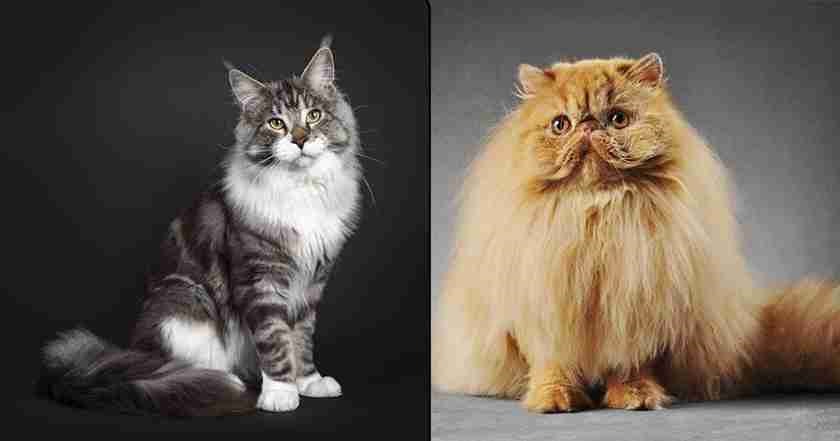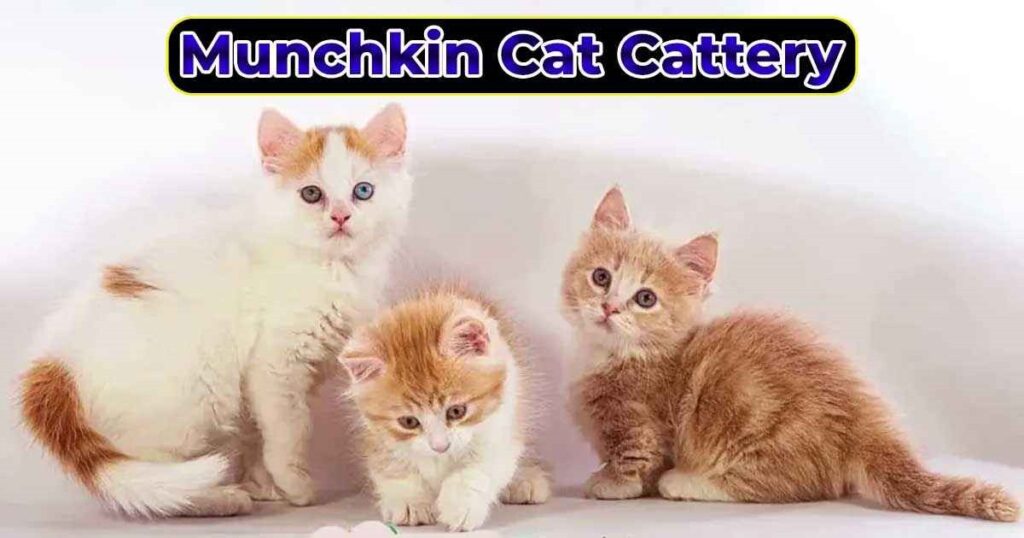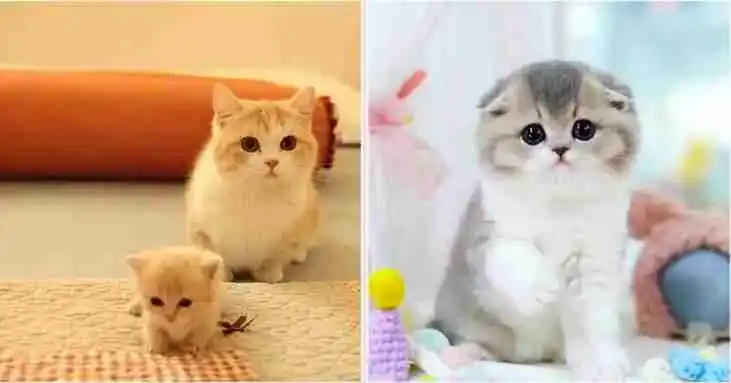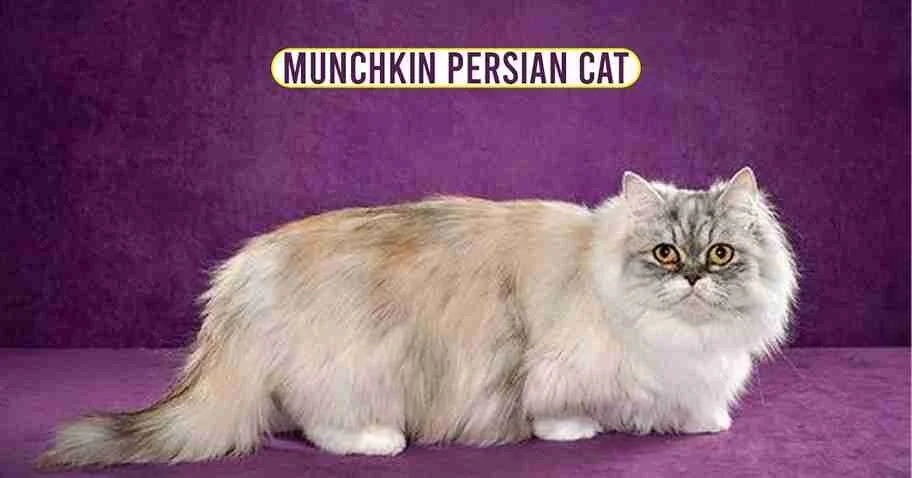The Munchkin Ragdoll cat is an enchanting blend of two beloved feline breeds: the playful and affectionate Ragdoll and the short-legged curious Munchkin. This hybrid boasts the striking blue eyes and silky semi-long fur typical of the Ragdoll combined with the distinctive short legs of the Munchkin, giving it a uniquely adorable appearance. Known for their gentle temperament these cats are highly sociable and thrive in family environments often forming strong bonds with their human companions.
Despite their small stature Munchkin Ragdolls are energetic and enjoy interactive play though they are equally content to snuggle on a cozy lap. They are intelligent and can be trained to perform tricks or respond to commands making them a delightful and engaging pet.
Regular grooming is necessary to keep their luxurious coat healthy, and they generally require a moderate amount of exercise to maintain their well-being. The Munchkin Ragdoll is a charming loyal and low maintenance companion for cat lovers seeking a balance of beauty, personality, and affection.
Munchkin Ragdoll Cats: A Comprehensive Guide
Munchkin Ragdoll cats are a delightful mix of two adored breeds the affectionate Ragdoll and the playful Munchkin. Known for their unique appearance and charming personality, these cats combine the Ragdoll’s striking blue eyes and luxurious semi-long fur with the Munchkin’s signature short legs creating a visually captivating and endearing companion.
Physical Characteristics
These cats are small to medium-sized with a well-proportioned body despite their short legs. Their coat is soft, silky, and comes in various colors and patterns typical of Ragdolls, including colorpoint, bicolor, and mitted. The short legs, a defining trait from the Munchkin parent, do not hinder their agility, though their movement may appear slightly different from standard cats.
Their luxurious coat requires regular grooming to prevent tangles and maintain its softness and shine. A brushing session two to three times a week is recommended. Munchkin Ragdolls have a moderate energy level, so daily play sessions with toys or interactive activities will help keep them mentally and physically stimulated.
Personality and Temperament
Munchkin Ragdolls are celebrated for their gentle, sociable, and loving nature. They are highly adaptable and thrive in homes with families, singles, or seniors. Their playful yet laid-back temperament makes them ideal for households with children or other pets. These cats are known for their intelligence and can be trained to perform tricks or walk on a leash, making them an interactive and entertaining addition to the family.
Health Considerations
While Munchkin Ragdolls are generally healthy, prospective owners should be aware of potential genetic health concerns inherited from both parent breeds. Ragdolls can be prone to heart conditions like hypertrophic cardiomyopathy (HCM), while Munchkins may face issues related to their skeletal structure. Regular veterinary check-ups are essential to ensure their well-being.
What Is a Munchkin Ragdoll Mix
A Munchkin Ragdoll mix is a cross between a Munchkin and a Ragdoll cat. These cats inherit the best traits from both breeds, making them a popular choice for families.
- Short Legs: The Munchkin’s trademark feature.
- Soft, Plush Coat: Inspired by the luxurious fur of Ragdolls.
- Friendly and Social: Loves human interaction.
- Playful Nature: Enjoys games and toys.
- Adaptable Personality: Fits well in small apartments or large homes.
Munchkin Ragdolls are perfect for those seeking a playful yet affectionate companion. Their unique features make them stand out among other hybrid breeds.
History of the Munchkin Cat Ragdoll
The history of the Munchkin Cat Ragdoll involves the blending of two distinct cat breeds: the Munchkin and the Ragdoll. Each breed has its own unique origins and characteristics, and their combination results in a hybrid that inherits traits from both.
A Gentle Giant The Ragdoll cat, on the other hand, has a more recent history. Developed in the 1960s by breeder Ann Baker in California, the Ragdoll was created through selective breeding to produce a large, gentle, and affectionate cat with striking blue eyes and a semi-long coat.
| Feature | Details |
|---|---|
| Body Structure | A combination of the Munchkin’s short legs and the Ragdoll’s medium to large, muscular body. |
| Coat Type | Usually long and plush, similar to the Ragdoll, with a soft and silky texture. |
| Coat Colors | Commonly found in colors like seal, blue, chocolate, and lilac, often with patterns like colorpoint, mitted, and bicolor. |
| Eye Color | Typically blue, a characteristic feature of the Ragdoll breed. |
| Overall Appearance | A unique blend of the Ragdoll’s elegance and the Munchkin’s distinctive short legs. |
Characterized by their affectionate disposition and laid-back nature, Ragdolls are adored for their loving temperament and gentle demeanor. These cats Fluffy companions are often described as “dog-like” in their behavior, forming strong bonds with their human caregivers and seeking out affection and companionship.
Why Choose a Munchkin Ragdoll Kitten?
Adopting a Munchkin Ragdoll kitten is an exciting experience. These kittens bring energy and love to any household.
Benefits of Adopting:
- Affectionate Companionship: They thrive on bonding with their owners.
- Low Maintenance: Their coats are easy to groom.
- Great with Kids: Gentle nature makes them ideal for families.
- Unique Appearance: Short legs and round faces create an adorable look.
- Longevity: A healthy mix often lives between 12–15 years.
Whether you’re an experienced cat owner or a first-timer, these kittens adapt well to most homes.
Munchkin Ragdoll Cat Price and Breeders
The price of a Munchkin Ragdoll cat varies depending on the breeder, location, and pedigree.
| Factor | Average Price |
|---|---|
| Standard Kitten | $500–$1,500 |
| Show-Quality Kitten | $2,000+ |
| Adoption Fees (Rescues) | $100–$300 |
Munchkin vs Ragdoll Cats
The Munchkin Ragdoll cat, also known as the Ragdoll Munchkin mix, is a fascinating hybrid that combines the distinct characteristics of both breeds. This unique crossbreed merges the Munchkin’s short legs and playful nature with the Ragdoll’s plush coat and gentle demeanor.
Often referred to as Munchkin Ragdoll kittens or Ragdoll Munchkin cats, these felines are known for their striking appearance and affectionate personality.
- Pedigree: High-quality lineage increases the cost.
- Coat Color and Pattern: Rare colors or patterns are pricier.
- Breeder Reputation: Trusted breeders often charge more.
- Health Tests: Certified health checks add value.
- Demand and Availability: Rare breeds command higher prices.
If you’re searching for a breeder, ensure they are ethical and prioritize the health of their cats.
Ragdoll Munchkin Cat Characteristics
The Ragdoll Munchkin cat is a unique hybrid that combines the affectionate, laid-back nature of the Ragdoll with the short legs of the Munchkin. This mix results in a cat that is not only adorable but also possesses a gentle and friendly temperament.
| Trait | Details |
|---|---|
| Temperament | Known for being affectionate, gentle, and laid-back, similar to Ragdolls. |
| Social Nature | They enjoy human interaction and get along well with other pets and children. |
| Playfulness | Playful and curious like Munchkins, but with the relaxed demeanor of Ragdolls. |
| Loyalty | Very loyal and often follow their owners around the house. |
| Vocalization | Generally quiet, with soft, sweet voices. |
Where to Find Munchkin Ragdoll Cats for Sale
Finding a Munchkin Ragdoll kitten or cat for sale requires patience and research.
Popular Options:
- Reputable Breeders: Look for breeders specializing in Munchkin and Ragdoll mixes.
- Adoption Centers: Check local shelters for hybrid cats.
- Online Marketplaces: Use trusted platforms like Petfinder.
- Social Media: Join Munchkin or Ragdoll cat communities.
- Referrals: Ask pet owners for recommendations.
When purchasing, ask for health certificates and a detailed history of the kitten’s parents. Due to their short legs, these cats may be prone to certain health issues, such as joint problems and obesity, so maintaining a healthy diet and providing regular exercise is crucial.
Ragdoll Munchkin kittens should be socialized early to ensure they develop into well-adjusted adult cats. As with all hybrids, potential owners should be aware of and prepared for any breed-specific health issues.
Ragdoll Cat Health Issues
Ragdoll cats are generally healthy but can be predisposed to certain health issues due to their genetics and breed traits. Common health concerns include:
- Hypertrophic Cardiomyopathy (HCM): A heart condition that is relatively common in Ragdolls. Regular screenings can help detect this issue early.
- Polycystic Kidney Disease (PKD): While less common, some Ragdolls may develop cysts in their kidneys, leading to potential kidney failure.
- Bladder Stones: They may be prone to urinary tract issues, including bladder stones, so providing a proper diet and ensuring hydration is essential.
- Obesity: Their laid-back nature can make them prone to weight gain, so a balanced diet and regular exercise are crucial.
- Dental Issues: Regular dental care is important to prevent periodontal disease, which can impact their overall health.
Routine veterinary check-ups, a balanced diet, proper grooming, and an active lifestyle can help manage these risks and ensure a long, healthy life for your Ragdoll cat.
Lifespan: On average, Ragdoll Munchkin cats have a lifespan of 12 to 15 years, with some living into their late teens with proper care.
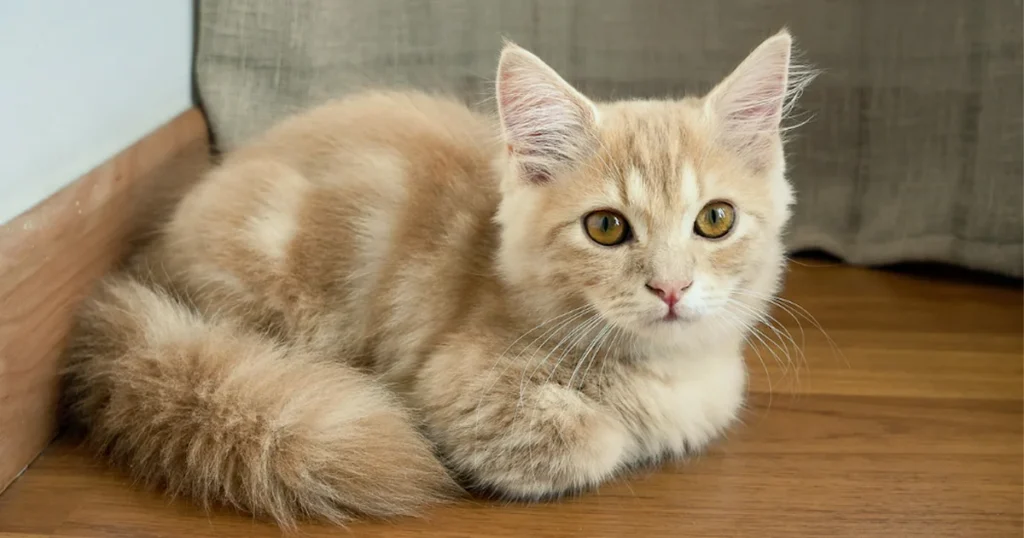
Temperament and Behavior
Ragdoll cats are known for their gentle, laid-back temperament and affectionate behavior. They are often described as “dog-like” due to their tendency to follow their owners around and form strong bonds with them. Ragdolls are typically calm friendly and sociable making them excellent companions for families children, and other pets.
They are not overly demanding but enjoy being petted and cuddled, often going limp in your arms, which gives them their name “Ragdoll.” Ragdolls are generally easygoing, patient, and tolerant, even with new people or unfamiliar situations.
They are not usually aggressive or territorial and tend to get along well with other pets including dogs. However because of their calm nature they can be vulnerable to rough handling, so it’s important to provide them with a safe secure environment where they feel comfortable and relaxed. Despite their relaxed nature, they still enjoy interactive play and mental stimulation, often engaging with toys and participating in games with their owners.
Munchkin Ragdoll Cat Care Guide
Caring for a Munchkin Ragdoll is straightforward. These cats are low-maintenance but benefit from regular attention.
Grooming Needs:
- Brushing: Twice a week to prevent matting.
- Bathing: Occasional baths to maintain coat health.
- Nail Trimming: Once every two weeks.
- Dental Care: Weekly brushing for optimal oral health.
- Ears and Eyes: Regular cleaning to prevent infections.
| Care Routine | Frequency |
|---|---|
| Brushing | 2–3 times weekly |
| Nail Trimming | Biweekly |
| Health Checkups | Annually |
By maintaining a consistent care routine, you’ll keep your Munchkin Ragdoll happy and healthy for years to come.
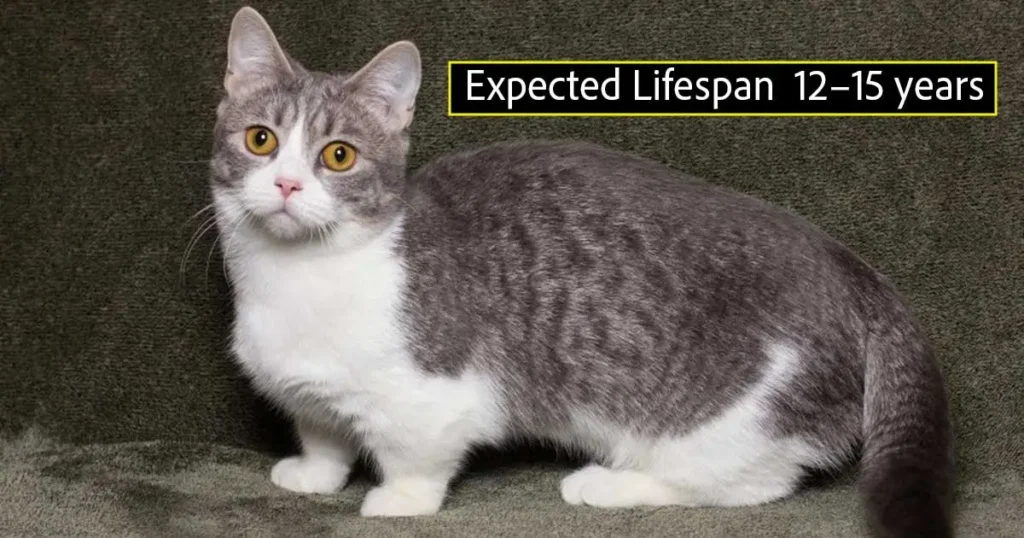
Color point Coat Examples: Ragdolls are known for their variety point coat designs, which highlight a hazier tinge on their ears, face, paws, and tail, with a lighter body tone. Normal varieties incorporate seal, blue, chocolate, lilac, and the sky’s the limit from there.
Ragdolls vs Munchkin Size
Ragdoll felines are known for their huge size and significant form. Grown-up Ragdolls can weigh somewhere in the range of 10 to 20 pounds or more, with guys normally being bigger than females. Typical adult female Munchkin cats weigh 5-7 pounds, while equivalent female Ragdolls weigh 10-15 pounds. Male Munchkins typically weigh 7-10 pounds, while male Ragdolls average 15-20 pounds.
| Characteristic | Ragdoll Cat | Munchkin Cat |
| Size | Large | Small |
| Weight | 10 to 20+ pounds (4.5 to 9+ kg) | 5 to 9 pounds (2.3 to 4 kg) |
| Body Build | Sturdy, substantial | Proportionate, muscular |
| Legs | Normal length | Short |
| Appearance | Broad chest, muscular body, long flowing fur | Well-proportioned, short legs |
| Presence | Impressive, commanding | Petite, compact |
| Agility | Moderate | Surprisingly agile |
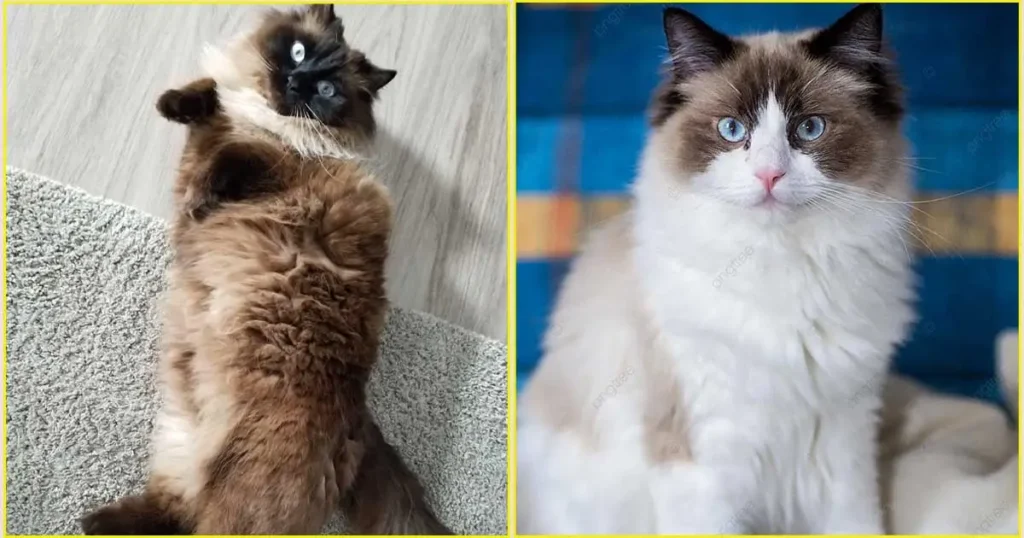
Temperament and Personality
This hybrid is renowned for its delightful personality, blending the traits of both parent breeds:
- Affectionate and Social: The Ragdoll’s loving nature shines through, making this mix a cuddly and people-oriented pet.
- Playful and Curious: From the Munchkin, they inherit a playful and adventurous spirit, often exploring their surroundings despite their shorter legs.
- Gentle and Friendly: They are excellent with children and other pets, making them a great choice for families.
- Intelligent: This mix is known for their intelligence, often learning tricks or engaging in interactive play with their owners.
